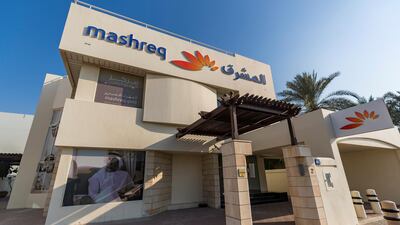Mashreq Bank, the Dubai lender controlled by the Al Ghurair family, swung to a loss in the third quarter as impairment allowances climbed amid the coronavirus pandemic.
The company declared a Dh183 million net loss in the three months to the end of September, compared to a net profit of Dh536m during the same period year earlier, the lender said in a statement to the Dubai Financial Market, where its shares trade. Impairment allowances during the period almost trebled to Dh665m, while net interest income and income from Islamic financing fell 38 per cent to Dh561m.
“The tough operating conditions saw an increase in our net impairment allowances, driven by specific credit provisions and anticipated credit losses linked to the Covid-19 pandemic,” Ahmed Abdelaal, group chief executive of Mashreq Bank, said. “We have worked hard to support all our clients through the immediate introduction of the UAE Central Bank’s TESS programme, in addition to our own relief programme that has enabled our customers to defer their principal and interest payments.”
The bank’s nine-month net profit dropped 80 per cent to Dh352m as impairment allowances more than doubled to Dh1.64 billion.
Banks globally have reported falling profits and higher provisions in the wake of the pandemic, which disrupted global trade and slowed economic activity as countries enforced lockdowns to contain the coronavirus.
The world economy is in its deepest recession since the Great Depression and is set to shrink 4.4 per cent this year before it rebounds unevenly in 2021, according to the International Monetary Fund.
The UAE has reopened its economy gradually since movement restrictions were introduced in March, and business activity has picked up on the back of monetary and fiscal support.
“At Mashreq, we remain fully aligned to support the UAE economy and our communities, as we together pave the way to recovery,” AbdulAziz Al Ghurair, chairman of Mashreq, said. “We will also continue to look at capitalising on opportunities in the digital and technology space, with the ultimate aim of serving our customers better.
COMPANY%20PROFILE
%3Cp%3E%3Cstrong%3ECompany%20name%3A%3C%2Fstrong%3E%20Alaan%3Cbr%3E%3Cstrong%3EStarted%3A%3C%2Fstrong%3E%202021%3Cbr%3E%3Cstrong%3EBased%3A%3C%2Fstrong%3E%20Dubai%3Cbr%3E%3Cstrong%3EFounders%3A%3C%2Fstrong%3E%20Parthi%20Duraisamy%20and%20Karun%20Kurien%3Cbr%3E%3Cstrong%3ESector%3A%3C%2Fstrong%3E%20FinTech%3Cbr%3E%3Cstrong%3EInvestment%20stage%3A%3C%2Fstrong%3E%20%247%20million%20raised%20in%20total%20%E2%80%94%20%242.5%20million%20in%20a%20seed%20round%20and%20%244.5%20million%20in%20a%20pre-series%20A%20round%3Cbr%3E%3Cbr%3E%3C%2Fp%3E%0A
Tonight's Chat on The National
Tonight's Chat is a series of online conversations on The National. The series features a diverse range of celebrities, politicians and business leaders from around the Arab world.
Tonight’s Chat host Ricardo Karam is a renowned author and broadcaster who has previously interviewed Bill Gates, Carlos Ghosn, Andre Agassi and the late Zaha Hadid, among others.
Intellectually curious and thought-provoking, Tonight’s Chat moves the conversation forward.
Facebook | Our website | Instagram
The years Ramadan fell in May
UAE currency: the story behind the money in your pockets
Benefits of first-time home buyers' scheme
- Priority access to new homes from participating developers
- Discounts on sales price of off-plan units
- Flexible payment plans from developers
- Mortgages with better interest rates, faster approval times and reduced fees
- DLD registration fee can be paid through banks or credit cards at zero interest rates
Hili 2: Unesco World Heritage site
The site is part of the Hili archaeological park in Al Ain. Excavations there have proved the existence of the earliest known agricultural communities in modern-day UAE. Some date to the Bronze Age but Hili 2 is an Iron Age site. The Iron Age witnessed the development of the falaj, a network of channels that funnelled water from natural springs in the area. Wells allowed settlements to be established, but falaj meant they could grow and thrive. Unesco, the UN's cultural body, awarded Al Ain's sites - including Hili 2 - world heritage status in 2011. Now the most recent dig at the site has revealed even more about the skilled people that lived and worked there.
Correspondents
By Tim Murphy
(Grove Press)
Global state-owned investor ranking by size
|
1.
|
United States
|
|
2.
|
China
|
|
3.
|
UAE
|
|
4.
|
Japan
|
|
5
|
Norway
|
|
6.
|
Canada
|
|
7.
|
Singapore
|
|
8.
|
Australia
|
|
9.
|
Saudi Arabia
|
|
10.
|
South Korea
|
Real estate tokenisation project
Dubai launched the pilot phase of its real estate tokenisation project last month.
The initiative focuses on converting real estate assets into digital tokens recorded on blockchain technology and helps in streamlining the process of buying, selling and investing, the Dubai Land Department said.
Dubai’s real estate tokenisation market is projected to reach Dh60 billion ($16.33 billion) by 2033, representing 7 per cent of the emirate’s total property transactions, according to the DLD.


